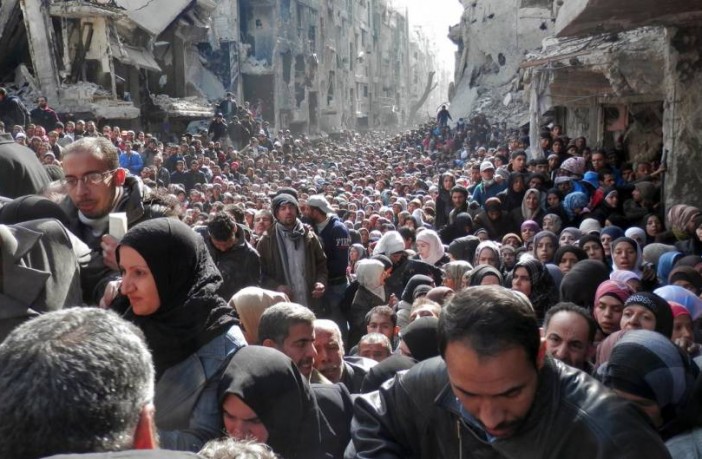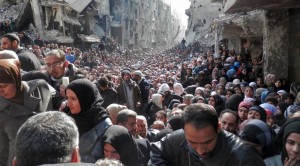Foreign Policy
Blog
BY Aaron David Miller
The Arab world’s a mess and its leaders don’t appear ready to assume much responsibility for fixing it. Maybe it’s time for the rest of us to start demanding they step up.
The recent reportsof the atrocities perpetrated by the Islamic State (IS) in the Yarmouk refugee camp in Syria — a population of 18,000 Palestinians and Syrians who have already been subjected to years of shelling, blockades, forced starvation, and barrel bombs by the Bashar al-Assad regime — have again prompted me to ask the question: Where are the Arab states?
As my friend and one of the most astute analysts of Arab politics, the inestimable Hussein Ibish, told me the other day, the Arab states that claim to care about the Palestinians should at least try to do something about Yarmouk, including making clear there is a safe space outside of Syria for each and every one of the 18,000 residents still trapped in the refugee camp. And they can do that by demanding safe passage for these victims from both Assad and IS, or even airlifting food and other supplies to the camp, however difficult that might be. After all, Jordan’s King Abdullah all but declared war on IS after a Jordanian pilot was burned alive. So what about the thousands of suffering and dying Palestinians and Syrians? Once again, another regional disaster is left to the international community, which of course can’t or won’t do much about it either.
Then again, why should the lack of effective and credible response from the Arab states in the face of the suffering of their fellow Arabs surprise us? The Arab states have been betraying the Palestinians for years — pretending to trumpet the Palestinian cause, using them in the struggle against Israel when it suited them, and settling with the Israelis at their expense when it did not. And always the Arab regimes sought to dominate, control, and confront the forces of Palestinian nationalism — in Jordan (1970), Lebanon (1975 to 1976), and Syria (1983). Or look at the deafening silence with which the Arab world reacted to the Palestinian civilian deaths during the Israel-Hamas war in Gaza last summer. Driven by their fear and loathing of the Sunni jihadis, the Egyptians and Saudis not all that secretly favored Israeli efforts to crush Hamas.
And if they were willing to stand by and do little to support the Qadiyat Filastin, or the Palestinian cause, why would they intercede on behalf of Arab populations in rival regimes that were crumbling and torn apart in the Arab Spring, a phenomenon much better described as the Great Arab State Meltdown? The Gulf states were only too willing to back their favorite Syrian opposition groups with money and guns in the battle against the Assad regime and to participate in token fashion in much-ballyhooed allied coalitions against IS. But these efforts did little to change the battlefield balance or to alleviate the humanitarian suffering of the local populations. Not even the Americans could do that. Though, to their credit, the Jordanians in particular, along with the Lebanese and the non-Arab Turks, have absorbed hundreds of thousands of Syrian refugees at considerable cost to their own economies and stability. After all those years the Gulf states spent coddling and bankrolling the brutal Assad regime, the Syrian crisis has come back to haunt them, in particular.
It may be politically provocative and incorrect to inquire. But the question is worth asking again: Why don’t (or can’t) the Arabs take more responsibility for the problems that affect their region? It’s their neighborhood, after all. Shouldn’t we have reason to expect them to do more? And if not, why not?
Part of me knows all too well what the answers are. Given the divisions in the Arab world, collective action of any kind — other than rhetoric — has always been something of an extended thought experiment. It’s also a lot easier to hammer the United States for its risk-averse, strategy-less, inconsistent, and incoherent policies on everything from issuing weapons to the resistance in Syria or playing footsie with Iran; for the invasions of Iraq; for support for authoritarian regimes, drone strikes, often uncritical backing of Israel, and on and on. And while we’re at it, let’s blast the Israelis too and blame them as the Arab states have for their shortsighted policies on the Palestinian issue, from settlements to refusing to set up a real state for the Palestinians. It’s always somebody else’s fault, so let’s get somebody else to fix it — America, the United Nations, the P5+1, or the International Criminal Court (ICC).
This lack of capacity and will to address what ails their broken region predated the ill-fated Arab Spring, in which at least four Arab states — Syria, Yemen, Libya, and Iraq — are now in varying degrees of meltdown. And it’s been quite a long time since strong Arab leaders demonstrated the kind of bold independent action in war or peace of an Anwar Sadat, a King Hussein, or even a more cautious Saudi King Abdullah with his Arab Peace Initiative.
So, in the spirit of the recently concluded Passover, let me ask the following four questions:
No. 1: Why, despite their aversion to colonialism, their sensitivity to great-power meddling in their affairs, their conviction that the United States, Israel, the CIA, and the Mossad control their world, do the Arab states insist on infantilizing themselves by surrendering war-making (and peacemaking, too, for that matter) to the international community?
No. 2: Why do the Arab states, particularly in the Gulf, stand by and not exercise their agency? They have military forces, sophisticated weapons, billions in cash, intelligence services, and they know the ins and outs of their neighborhoods better than we do.
No. 3: Why, when Arab coalitions do form to take up a challenge or two, is the gap between high-sounding rhetoric and action so large, the results so consistently meager, and the prospects for screw-ups so large?
No. 4: And why does the United States so willingly put up with these regimes and their obedient media outlets that blast U.S. policy while at the same time they are so dependent on America to help solve their problems?
The last question may well be the easiest to answer: In the wake of the Great Arab Meltdown, the United States can’t be so choosy about its friends. We don’t have all that many these days. As for questions No. 1 to No. 3, I do not have the answers to any of them, including what role Islam and its relationship to the state plays in all of this. I could start with the lack of sufficient capacity to summon up effective and collective action to address any regional problem. I could then move on to speculate that when you’re so focused in protecting your own regime, you really don’t have a lot of time or resources to fix others’ broken houses. Indeed, you don’t have to dig very deep below the surface of vaunted concepts of Arab unity and brotherhood to discover deep resentment, rivalry, and suspicion among the Arab states and thus an “every man for himself” dynamic.
Perhaps as U.S. influence wanes in the region in the face of so many hopeless problems, key Arab states — the ones that are not caught up in civil war and sectarian strife — will increasingly become less dependent and risk-averse. The Saudi effort in Yemen and the formation of an Arab response force (presumably to counter Iranian influence) may be the beginning of a trend. Given the ineffectiveness of the Saudi intervention so far, I’m not all that encouraged. But at least the Saudis are acting the part.
The Arab world’s a veritable mess. The cosmic leadership deficit, the absence of legitimate institutions, the lack of transparency, disrespect for human rights, abysmal regard for gender equality, and too much conspiratorial thinking make it impossible to come to terms with the magnitude of the problems. In short, this region will remain broken, angry, and dysfunctional until the leaders who purport to take responsibility for governing these unhappy lands get their proverbial acts together. And that’s … well, a generational enterprise at best, and I suspect something that will take a good deal longer.
What’s required is some kind of unrealistic grand reformation on multiple levels that is just not going to happen. It’s hard for all societies to look inward and take stock. It’s much easier to externalize the problem and the solution, particularly if they don’t like what they see. Still, Michael Jackson had it right. If you want to make a change, the place to start is not by blaming somebody else. It’s first to take a long, hard look at the man in the mirror staring down and taking stock of your own shortcomings. It may not be pretty. But it is necessary and when it comes to the Arab world it’s long overdue.
Photo by United Nation Relief and Works Agency via Getty Images








